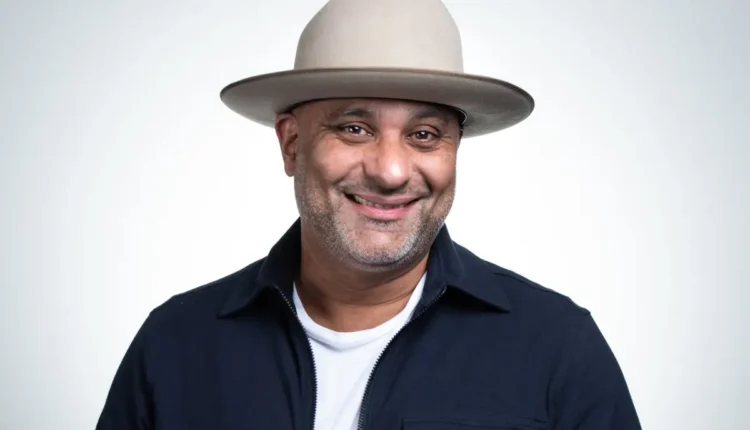Russell Dominic Peters, born on September 29, 1970, is a name synonymous with groundbreaking comedy. He has not only made his mark as a Canadian stand-up comedian but also as an actor and producer. From his early days performing in Toronto to becoming the first comedian with a Netflix stand-up special, Peters has transformed the world of comedy and inspired millions. His story is one of resilience, creativity, and unwavering determination, making him a true icon in entertainment.
Early Life and the Struggles of Identity
Russell Peters was born to immigrant parents from India, Eric and Maureen Peters, in Toronto, Ontario. Raised in a multicultural environment, Russell Peters faced the typical struggles that many immigrants encounter — balancing his Anglo-Indian heritage with the Canadian culture around him. His family’s move to Brampton when he was four, coupled with attending Chinguacousy Secondary School and North Peel Secondary School, exposed him to constant bullying due to his ethnicity.
However, instead of letting this adversity break him, Russell Peters fought back in an unconventional way — by learning boxing. This newfound strength wasn’t just about defending himself physically but also about building inner confidence.
Russell Peters embraced the world of hip-hop and DJing, finding solace and community in Toronto’s emerging scene during the 1990s. These formative years shaped Peters’ identity, setting the stage for his unique voice in comedy, one that would bridge cultural divides and challenge stereotypes.
The Beginning of a Comedic Legend
Russell Peters began his journey into stand-up comedy in 1989, performing in small clubs in Toronto. His big break came in 1992 when he met American comedian George Carlin, a legend who had a profound impact on his career. Carlin’s simple advice, “get on stage whenever and wherever possible,” resonated deeply with Peters. Fifteen years later, Peters had the honor of hosting one of Carlin’s final shows, bringing his journey full circle. Peters credits Carlin’s mentorship as a crucial influence on his career trajectory.
Russell Peters didn’t just follow the traditional path of comedy — he blazed his own trail. His observational humor, often centered on cultural stereotypes, resonated with audiences from diverse backgrounds. By pointing out differences with a sense of humor rather than division, Peters built an inclusive comedic style that was accessible to people from all walks of life.
The Viral Breakthrough: Comedy Now!
In 2004, Peters’ career skyrocketed after his performance on the Canadian TV show Comedy Now! was uploaded to YouTube. The viral nature of this special took his jokes across borders, earning him international recognition almost overnight. The skits, which hilariously dissected cultural stereotypes, struck a chord with various ethnic groups. Russell Peters became a champion for multicultural humor, an approach that not only entertained but also created awareness and empathy.
One of Peters’ famous punchlines, “Somebody gonna get a hurt real bad,” exemplified his storytelling genius. The joke, rooted in his experiences growing up in a strict Indian household, became a cultural phenomenon. His ability to blend personal anecdotes with global humor allowed him to cross geographic and cultural boundaries, turning his performances into worldwide events.
A Global Stand-Up Sensation
Russell Peters is not just a Canadian sensation; he is a global comedy phenomenon. His success continued with record-breaking performances in major cities around the world.
In 2007, Peters became the first comedian to sell out Toronto’s Air Canada Centre, an achievement that highlighted his immense popularity. By 2009, he had broken the UK comedy sales record with a sold-out show at London’s O2 Arena. Australia followed suit in 2010, where Peters’ show attracted an audience of 13,880, the largest-ever stand-up comedy crowd in the country’s history.
These milestones speak not only to Peters’ talent but to his ability to connect with audiences across cultures. He’s proven that comedy, when crafted with authenticity and understanding, can transcend language and cultural barriers.
Forbes’ Highest-Paid Comedian and Netflix Pioneer
By 2013, Peters’ remarkable journey saw him become one of the world’s highest-paid comedians. Ranked third on Forbes’ list of the world’s highest-paid comedians, he earned an astounding $21 million in that year alone. What makes his success even more impressive is how he achieved this on his own terms, without fitting into the conventional mold of comedy.
In 2013, Russell Peters became the first comedian to secure a stand-up special with Netflix, marking yet another groundbreaking achievement in his career. His special, along with others like Outsourced and Red, White and Brown, showcased his ability to weave personal experiences into universally relatable humor.
From Stand-Up to Producing: Expanding Horizons
Russell Peters has expanded his career beyond stand-up comedy. He has produced and starred in the critically acclaimed documentary series Hip-Hop Evolution, which won both a Peabody Award and an International Emmy Award for Best Arts Programming in 2016. This project was a testament to Peters’ versatility as an entertainer and producer, showing that his talents extend far beyond the stage.
Inspirational Impact: More Than Just Laughter
Russell Peters’ story is not just one of fame and fortune; it’s one of resilience and breaking barriers. As one of the first South Asian comedians to achieve international fame, he has opened doors for countless others in the entertainment industry. He took the adversity he faced, both as a child and as a comedian of color, and turned it into fuel for his success. His ability to navigate and celebrate cultural differences through humor has brought communities together, fostering understanding and laughter in equal measure.
Peters’ journey serves as an inspiration to anyone facing challenges due to their background or identity. His story reminds us that the very things that make us different are often the things that give us strength. By embracing his heritage and experiences, Russell Peters became a voice for those who felt underrepresented, showing the world that comedy can be both a platform for change and a tool for healing.
Also Read:Ranj Pillai: Empowering Yukon’s Future Through Inclusive Leadership

